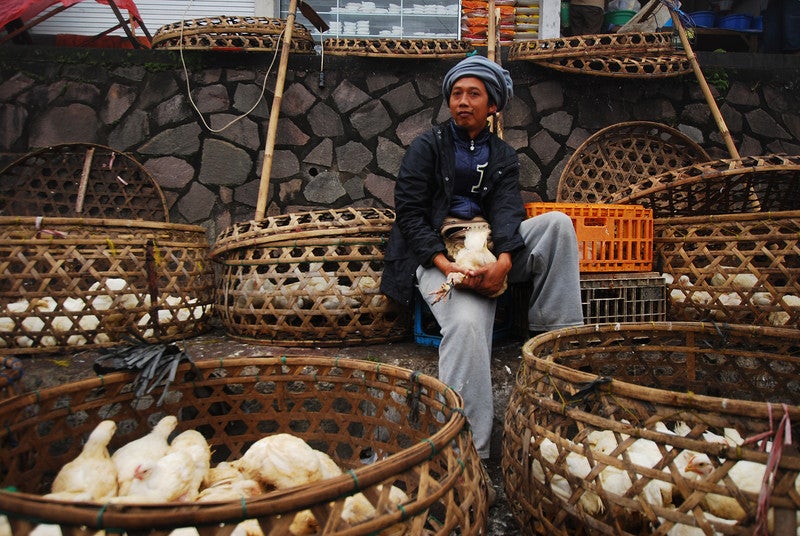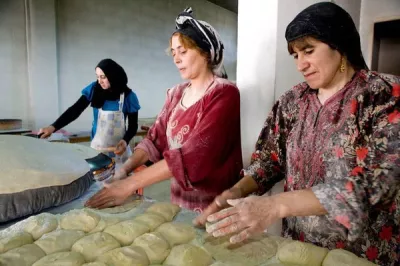Smart Policy: Why Islamic Banks Matter in Indonesia
In Indonesia, Islamic banks are young compared to their conventional peers, which date back to the early 19th century. Even after the first Islamic bank—Bank Muamalat—appeared on the scene in 1992, uptake was slow. In fact, in the ensuing 15 years, only two other Sharia-compliant banks entered the market.
All that changed in July 2008, when the Government of Indonesia issued the Sharia Banking Law which led to a period of strong growth for the Islamic banking industry—growth that shows no sign of abating. According to data from Bank Indonesia, between 2008 and 2012, Islamic bank assets tripled, increasing by an average of 31.5% annually.
 A chicken seller waits at his shop.
A chicken seller waits at his shop.
Photo Credit: Muhammad Rasid
And that’s not all: In the same period, the number of outlets increased from 241 to 517 because of 11 fully Sharia-compliant banks, 24 banks with Sharia-compliant “windows,” and 158 Sharia-compliant rural banks throughout the country.
Combined, these providers boasted assets hovering around $20 billion. But despite their stellar growth, Sharia-compliant financial service providers accounted for only 4.5% of total banking sector assets.
Why Bother?
Policy discussions around Islamic bank development in Indonesia have largely taken place in the context of increasing financial access, especially to micro, small, and medium enterprises, or MSMEs. There are two reasons for this.
First, according to official government statistics, Indonesia has more than 50 million MSMEs, representing some 97% of all enterprises and contributing no less than 30% of GDP growth in 2012. Not surprisingly, though, many of these do not have adequate access to the bank financing they need to grow their businesses.
Second, Sharia-compliant banks appear to be more accessible and responsive to MSME financing needs, outpacing conventional bank outreach to these enterprises. (In 2012, for example, more than half of total Islamic bank financing went to MSMEs.)
Digging Deeper
To better understand why and how Islamic banks are reaching more MSMEs—and to harness the potential for even more outreach—the World Bank in Jakarta conducted a 2012 survey of 978 MSMEs as well as 70 banks, including Islamic banks and conventional banks with Sharia-compliant windows. The respondents were located in 11 major cities across Indonesia.
Remarkably, about half of the participating MSMEs were already availing themselves of Sharia-compliant financial services. Still, the survey showed that most MSMEs had fairly low levels of awareness about the various financing products offered by Sharia-compliant banks.
That lack of awareness, we found, is one of the primary barriers to entry for potential new clients. The reality is that even the lingo of Islamic finance is sometimes intimidating, much less understood. And that’s where loan officers can make a difference.
Increasing Outreach
Our survey concluded that bank officers are the key to stimulate demand for Sharia-compliant financing. Nearly a third of MSME respondents cited their bank officers as the main source of education on Islamic products, but most of these respondents said they’d like to know more.
For their part, Islamic banks recognize the impact their officers can have on client education, but the survey also clearly revealed a gap in resources to that end. In fact, 52% of all MSME respondents claimed that they were not aware of any educational activities organized by Islamic banks in their neighborhoods (instead, a sizable proportion of respondents said they went to Sharia-compliant banks on the recommendation of relatives and friends).
At the same time, 60% of MSME respondents who were not currently using Sharia-compliant services said they would do so if they knew more about the products on offer. With financing a key need for millions of micro to mid-sized entrepreneurs, empowering Islamic financial service providers to reach more clients is not only good for business. It’s smart policy.
---- The author is a Senior Financial Sector Specialist at the World Bank in Jakarta.




Comments
Some of the data regarding
Some of the data regarding the number of banking outlets are not found on the Bank of Indonesia's website. Could you please identify your source? Where can you find the report on the World Bank site? What about the risk associated with Sharia lending? Historically, aren't these loans riskier? How much has the currency risks affected Sharia banking in Asia?
Thank you!
Add new comment